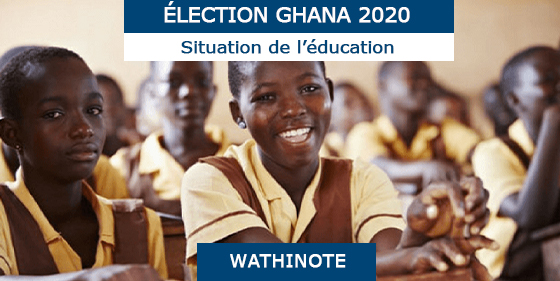

Author: U.S. EMBASSY
Publication Type: report
Date of publication: 2019
Ghana operates on a 6-3-3-4 system:
- Primary School — 6 years
- Junior High School — 3 years
- Senior High School — 3 years
- University Bachelor’s degree — 4 years
Basic Education
Pre-school, Primary classes 1-6, and Junior High School forms 1-3 comprise basic education in Ghana, which is compulsory. The sole official language of instruction throughout the Ghanaian educational system is English.
Students may study in any of eleven local languages for much of the first three years, after which English becomes the medium. Students continue to study a Ghanaian language as well as French as classroom subjects through at least the ninth grade. All textbooks and materials are otherwise in English.
Senior High School
Over 500,000 Ghanaian students take the Basic Education Certificate Examination (BECE) at the end of JHS Form 3 (ninth grade) in seven subjects. Admission to Senior High School is competitive: not all students can get admitted into the 500 public and 200 private national secondary schools.
The vast majority of Ghanaian students attend public boarding schools, many of which are highly competitive; there are only a dozen international private secondary schools in the country, collectively graduating fewer than 1,000 students a year and offering the IB or A-level curricula. In the public national schools, all students take a Core curriculum consisting of English Language, Integrated Science, Mathematics, and Social Studies.
Each student also takes three or four Elective subjects, chosen from one of seven groups: Sciences, “Arts” (social sciences and humanities), Vocational (visual arts or home economics), Technical, Business, or Agriculture. The secondary school transcript should contain a letter or percentage grade for each subject, for each of three terms, for the three years of senior secondary school, equivalent to the tenth through twelfth grades.
Students’ Term Reports (report cards) contain rank in class for each subject as well as grades for classwork and end of term exams. The grading system is tough: 80-100% is usually an A, a grade rarely awarded. At the end of Senior High School (twelfth grade), all students take the West African Senior Secondary Certificate Examination, or WASSCE, (SSCE through 2005; WASSCE beginning in 2006) in each of their seven or eight subjects.
These exams are given nationwide in April-June each year, but the results are not available until the following August. Grading is exceptionally tough: 4% of grades are A’s, and while 80% of grades are passes, only 53% of grades are credit passes of A1-C6. C’s can be quite competitive grades. In 2014, 28% of 242,000 WASSCE examinees obtained the minimum of six credit passes qualifying them for tertiary admission. Fewer than one-tenth of one percent earned grades of A1 in all eight subjects.
The minimum university standard for admission to post-secondary education is a ‘C-’ average on the WASSCE, with credits (A1-C6) in at least six subjects including Core English, math, integrated science and three Electives. U.S. universities should not admit Ghanaian students who have not attained at least this level.
The student provides you with a PIN number that they purchase for the equivalent of $3 (available at post offices or WAEC regional offices), that is used to retrieve a printable copy of their WAEC results. This is the fastest and most reliable way of verifying a student’s results from Ghana. All results from all WAEC exams dating back to 1993 can be verified through this site, which contains a QR code for retrieval.
University Education
Ghana’s tertiary institutions enroll over 350,000 students in undergraduate, graduate, certificate and diploma programs in a full range of academic and professional fields. The National Accreditation Board (www.nab.gov.gh) lists 140 accredited institutions, both public and private, offering four-year degrees as well as two and three-year diplomas, which are not equivalent to Bachelor’s degrees, but undergraduate transfer credit can be awarded. Twenty-six percent of tertiary students are enrolled in private institutions.
Ghanaian university admission is highly competitive, especially in fields such as medicine, engineering, law, business and pharmacy. The quality of education is considered reasonably high, evidence that human resources are more significant than material resources. In an effort to attract international enrollment, all Ghanaian universities operate on a modular, semester system. The University of Ghana is committed to 10% international population and attracts significant numbers of American students, as well as students from Africa and Europe. The United Nations University operates several programs on campus in fields of health and development.
Les Wathinotes sont des extraits de publications choisies par WATHI et conformes aux documents originaux. Les rapports utilisés pour l’élaboration des Wathinotes sont sélectionnés par WATHI compte tenu de leur pertinence par rapport au contexte du pays. Toutes les Wathinotes renvoient aux publications originales et intégrales qui ne sont pas hébergées par le site de WATHI, et sont destinées à promouvoir la lecture de ces documents, fruit du travail de recherche d’universitaires et d’experts.
